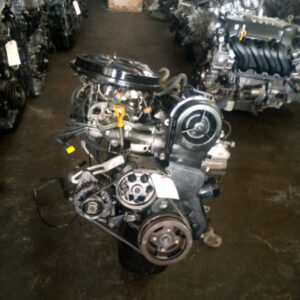Toyota Tazz: A Review of Its Handling, Fuel Economy, and Overall Performance
Toyota Tazz: A Review of Its Handling, Fuel Economy, and Overall Performance
Blog Article
Check Out the Newest Patterns in Engine Innovation Via Tazz
In the swiftly evolving landscape of auto modern technology, Tazz stands at the forefront, highlighting significant advancements in engine systems that prioritize both technology and sustainability. tazz. From crossbreed engines that enhance fuel performance to the introduction of hydrogen gas cells, the patterns forming modern-day powertrains are not just boosting performance however additionally attending to vital environmental challenges. As the industry proceeds to press borders, it is necessary to consider just how these advancements will affect future transport options and the more comprehensive effects for worldwide energy consumption. What lies in advance in this essential makeover?
Hybrid Engine Innovations
Crossbreed engine developments represent a crucial shift in automobile modern technology, combining the advantages of interior burning engines with electric propulsion systems. This integration not only boosts gas effectiveness yet also reduces exhausts, meeting progressively strict ecological regulations. By utilizing both power resources, hybrid engines can optimize efficiency, supplying power when required while preserving gas throughout less requiring motoring conditions.
Recent innovations in crossbreed technology consist of improvements in battery efficiency and regenerative braking systems. These advancements permit better energy recovery throughout deceleration, which can be redirected to assist in velocity or power accessory systems. Additionally, manufacturers are concentrating on small styles and lightweight materials to optimize the performance of hybrid powertrains.
The development of plug-in crossbreeds has additionally broadened the market, making it possible for chauffeurs to charge their automobiles utilizing standard electric outlets. This function frequently allows for significant all-electric variety, further decreasing dependancy on traditional fuels. tazz. As the auto industry remains to progress, hybrid engine modern technologies are anticipated to play an important duty in linking the space between standard automobiles and completely electric versions, giving a transitional remedy that deals with diverse consumer demands and choices
Breakthroughs in Electric Powertrains
The vehicle landscape is rapidly evolving, with electric powertrains arising as a leading pressure in lasting transport. Developments in electrical automobile (EV) technology are considerably improving performance, individual, and performance experience. Secret advancements include enhancements in battery chemistry, which have actually enhanced energy density, minimized charging times, and expanded total battery life.
Solid-state batteries, as an example, guarantee to transform the marketplace by providing greater security and performance contrasted to typical lithium-ion cells. Moreover, advancements in regenerative stopping systems are enabling lorries to recover energy throughout slowdown, adding to general effectiveness.
In enhancement to battery technology, electrical motor styles are ending up being extra advanced. Innovations such as incorporated electric motors and progressed thermal administration systems are assisting to maximize power shipment and decrease weight, inevitably enhancing lorry characteristics.

Jointly, these advances emphasize the commitment to transition in the direction of cleaner, a lot more effective transport solutions, placing electrical powertrains at the center of automobile technology.
The Increase of Hydrogen Gas Cells
Progressively, hydrogen fuel cells are acquiring grip as a sensible option to standard internal burning engines and battery electrical cars. This innovation harnesses the chemical energy kept in hydrogen, transforming it into electrical power via an electrochemical reaction with oxygen. The key byproduct of this procedure is water, making hydrogen gas cells an eco pleasant choice with zero discharges at the tailpipe.

Car manufacturers are significantly purchasing hydrogen gas cell modern technology, identifying its capacity for long-range applications and fast refueling abilities that rival standard fuels. Additionally, markets such as durable transportation and public transportation are especially appropriate for hydrogen fuel cells, where battery electrical remedies might fall short as a result of check weight and variety restrictions.
As research and financial investment proceed to expand, hydrogen gas cells are positioned to play a significant duty in the future landscape of tidy transport and energy solutions.
Enhancements in Internal Combustion Engines
Advancements in internal combustion engine (ICE) modern technology are transforming traditional cars to meet modern-day environmental requirements and efficiency expectations. Straight fuel injection, for instance, enables for better atomization of fuel, leading to even more complete combustion and boosted power output.
In addition, turbocharging has gotten prestige, permitting smaller engines to supply greater efficiency without the weight of larger engines - tazz. This modern technology not only increases efficiency yet likewise adds to reduce gas intake. Variable shutoff timing systems are likewise being fine-tuned, allowing engines to adjust to different driving problems for enhanced torque and responsiveness
Moreover, using lightweight materials in engine construction is becoming standard, additional boosting fuel performance by decreasing overall lorry weight. Engine control devices (ECUs) are progressively sophisticated, enabling real-time modifications that maximize performance and emissions.
These enhancements collectively signify a critical shift in ICE modern technology, aligning with international sustainability goals while still providing the efficiency drivers anticipate from their lorries. As the industry evolves, these renovations proceed to form the future of traditional vehicle engineering.
Future Fads in Engine Performance
Considerable advancements in engine performance are prepared for as producers focus on incorporating sophisticated innovations to meet strict environmental regulations and consumer needs. The change in the direction of electrification, hybrid systems, and different fuels is reshaping the automotive landscape, driving technologies that improve fuel economic situation and decrease discharges.
Among the vital fads is the execution Resources of advanced materials and making methods. High-strength alloys and lightweight compounds add to reduced lorry weight, thus boosting total effectiveness. Furthermore, the fostering of turbocharging and variable valve timing technologies permits for improved power outcome from smaller sized engines, even more boosting gas economic climate.

Conclusion
Innovations in crossbreed engine systems, electrical powertrains, and hydrogen gas cells demonstrate a commitment to reducing exhausts while improving performance. Enhancements in internal combustion engines and a focus on light-weight products contribute to overall engine effectiveness.
From crossbreed engines that enhance gas effectiveness to the development of hydrogen fuel cells, the trends forming contemporary powertrains are not only improving performance yet likewise dealing with critical ecological difficulties.Hybrid engine advancements stand for a crucial change in automobile technology, integrating the advantages of inner combustion engines with electrical propulsion systems.Furthermore, turbocharging has acquired importance, enabling smaller sized engines to deliver greater efficiency without the weight of larger engines. In addition, the adoption of turbocharging and variable shutoff timing technologies permits for improved power output from smaller engines, further enhancing gas economic climate.
Renovations in interior burning engines and a focus on lightweight products contribute to overall engine efficiency.
Report this page